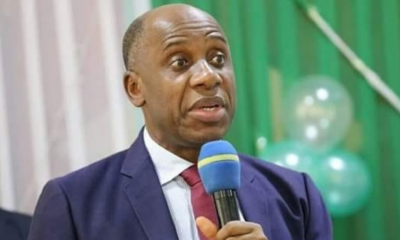Nigeria News
Abuja land: Wike may demolish 6,000 buildings in Lugbe, Idu, Garki, Katampe [Full list]

The nation’s capital, Abuja, is on the brink of a sweeping urban transformation as Nyesom Wike takes the helm as the newly appointed Minister of the Federal Capital Territory (FCT).
The implications of his appointment have sparked concerns and apprehension among landowners and residents as whispers of a potential demolition of thousands of structures loom large.
Unveiling his stance with an unwavering conviction, Wike’s message was unambiguous during his inaugural press conference: illegal and unapproved structures will face the wrecking ball.
“It’s time to address the distortion of Abuja’s master plan head-on,” Wike declared boldly. Regardless of stature, title, or affiliation, Wike’s vision for restoring the sanctity of the capital’s urban blueprint leaves no room for compromise.
Whispers have escalated to certainties as the Federal Government contemplates the demolition of an estimated 6,000 buildings and over 30 slums and illegal settlements sprawled across the Federal Capital Territory. The restoration of the master plan has become the guiding star for this monumental undertaking, aiming to rectify decades of unchecked urban expansion.
Among the neighborhoods on the line for transformation are a range of areas, from the bustling Garki to the more tranquil Katampe. Apo Mechanic Village, Byanzhin, Dawaki, Dei Dei, Durumi, Dutse, Gwagwalape, Idu, Jabi, and many more face the possibility of being reshaped by the force of this urban renewal initiative.
While the impending demolitions bring forth a tidal wave of uncertainty for thousands, another layer of complexity emerges. Those who have acquired lands from Abuja’s indigenous communities find themselves standing on shaky ground. The FCT Administration’s declaration of their acquisitions as illegal underscores the far-reaching scope of the restoration plans.
A deeper investigation unveils the 6,000 structures earmarked for potential demolition, a collection of buildings abandoned for an extended period in blatant violation of the established building codes. As the city evolves, the lingering scars of urban neglect are poised to be healed, even if it requires the painful act of tearing down.
























